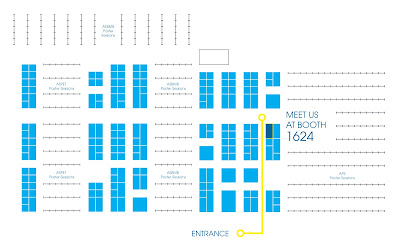Will you be attending the Experimental Biology meeting in San Diego next week? If so, visit booth #1624 to learn more about our range of cardiopulmonary solutions, including:
Model Development with the inExpose:
- In vivo disease models that mimic complex pathophysiological mechanisms of cardiopulmonary diseases using the inExpose, an automated platform for reproducible inhalation exposure (1,2)
- Smoke-induced alterations in cardiac and respiratory function through cigarette or e-cigarette exposure (3,4)
- Effective drug intervention for both preclinical subjects and cell culture exposures through aerosols (5,6).
- Studying the underlying pathophysiology of cardiopulmonary diseases by measuring the structure and function of the lung, along with quantifying the effects of pulmonary hypertension and decreased vascularization with the flexiVent (7,8,9).
- Pressure-volume manoeuvres, forced expired volume and other endpoints of clinical translational value performed by the flexiVent (10,11).
- Whole Body Plethysmography can be an easy tool for screening subjects quickly for preliminary respiratory data with the option of delivering inhaled therapeutics (12,13,14).
- Easy integration with simultaneous cardio and neuro recordings: electroencephalogram (EEG), electrocardiogram (ECG) & electromyogram (EMG).
- Monitoring physiological data from conscious freely moving rodents and large animals using easyTEL implantable telemetry systems. Different models are available to meet your study needs and provide monitoring of ECG, EEG, blood pressure, breathing rate, temperature and acceleration from 3-axis accelerometer (activity).
Sunday, April 22nd 9:00am – 4pm
Monday, April 23rd 9:00am – 4pm
Tuesday, April 24th 9:00am – 4pm
Click here to set-up a meeting to learn more about our solutions for cardiopulmonary studies.
References
1) Weist, E.F., et al. (2017). Omega-3 Polyunsaturated Fatty Acids Protect Against Cigarette Smoke-Induced Oxidative Stress and vascular Dysfunction. Toxicological Sciences, 156(1): 300-3102) Tewari et al. (2011). Identification of differentially expressed proteins in blood plasma of control and cigarette smoke-exposed mice by 2-D DIGE/MS. Proteomics, 11: 2051, 2011.
3) Olfert, M. et al. (2018). Chronic exposure to electronic cigarette results in impaired cardiovascular function in mice. J of Applied Physiology, 124(3): 573-582
4) Alasmari F, Crotty Alexander LE, Nelson JA, et al. (2017). Effects of Chronic Inhalation of Electronic Cigarettes Containing Nicotine on Glial Glutamate Transporters and α-7 Nicotinic Acetylcholine Receptor in Female CD-1 Mice. Vol 77. Elsevier Inc
5) Patolla et al. (2010). Formulation, characterization and pulmonary deposition of nebulized celecoxib encapsulated nanostructured lipid carriers. J Control Release. 144: 233-241
6) De Santis, et al. (2014). Pharmaceutical composition of oxidised avidin suitable for inhalation - De Santis. U.S. patent application 14/236,445
7) Alsaid, H., et al. (2011). Serial MRI characterization of the functional and morphological changes in mouse lung in response to cardiac remodeling following myocardial infarction. Magnetic Resonance in Medicine, 67(1): 191-200
8) Dayeh, N.R et al. (2017). Echocardiographic validation of pulmonary hypertension due to heart failure with reduced ejection fraction in mice. Scientific Reports, 1363
9) Karmouty-Quintana, H., et al. 2012. The A2B Adenosine Receptor Modulates Pulmonary Hypertension Associated With Interstitial Lung Disease. The FASEB Journal, 26(6): 2546-2557
10) Devos, F.C et al. (2017). Forced expiration measurements in mouse models of obstructive and restrictive lung diseases. Respiratory Research, 18(123)
11) Vanoirbeek, J. (2016). Forced Expiratory Volume (FEV) Measurements in Mouse Models of Lung Disease. American Journal of Respiratory and Critical Care Medicine, 193, A5957
12) Olea et al. (2011). Effects of cigarette smoke and chronic hypoxia on airways remodelling and resistance. Clinical Significance, 15; 179(2-3): 305-313
13) Ramnath et al. (2014). Extracellular matrix defects in aneurysmal fibulin-4 mice predispose to lung emphysema. PLOS One, 9(9): 106054
14) Zhuang, P., et al. (2016). cAMP-PKA-CaMKII signalling pathway is involved in aggravated cardiotoxicity during Fuzi and Beimu Combination Treatment of Experimental Pulmonary Hypertension. Scientific Reports, 6, 34903



No comments:
Post a Comment